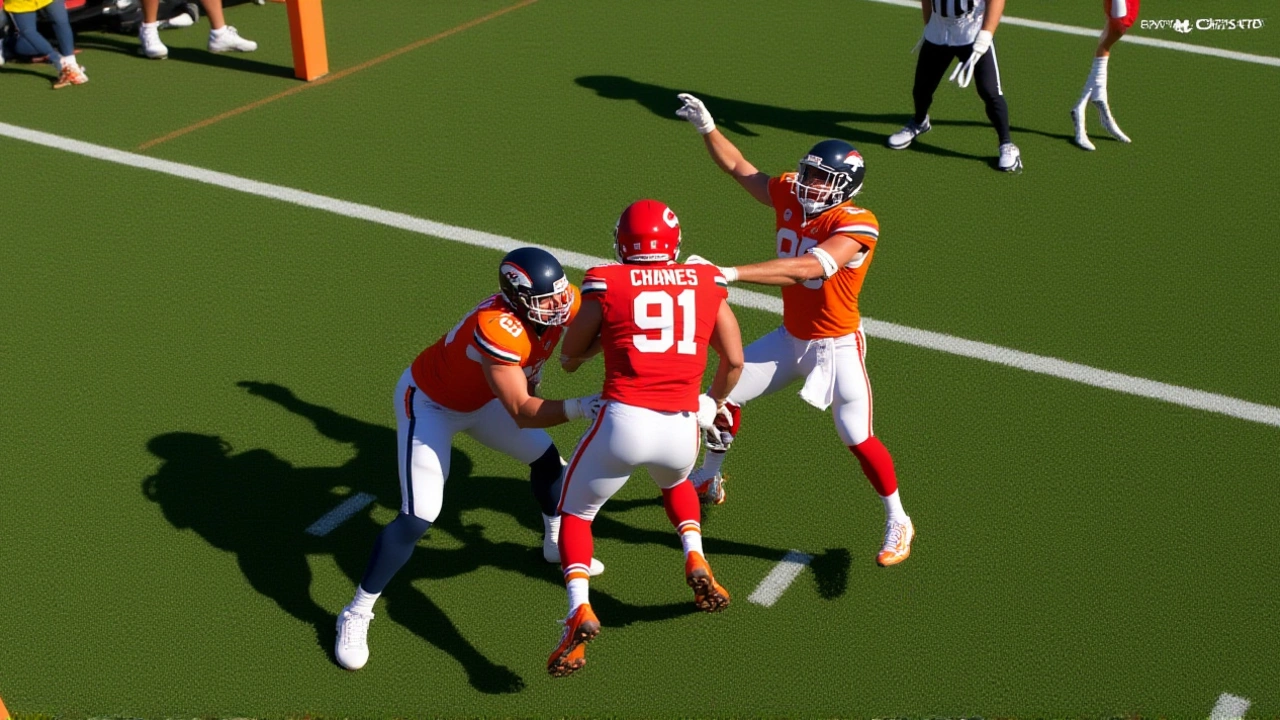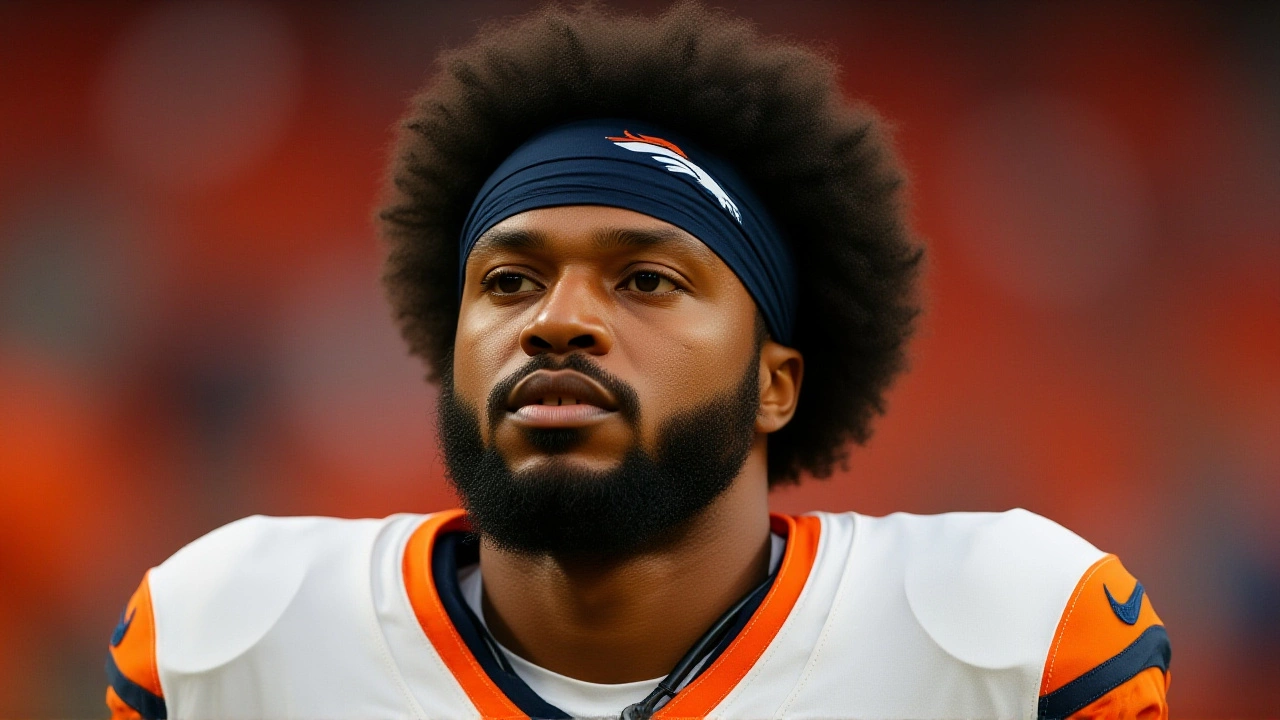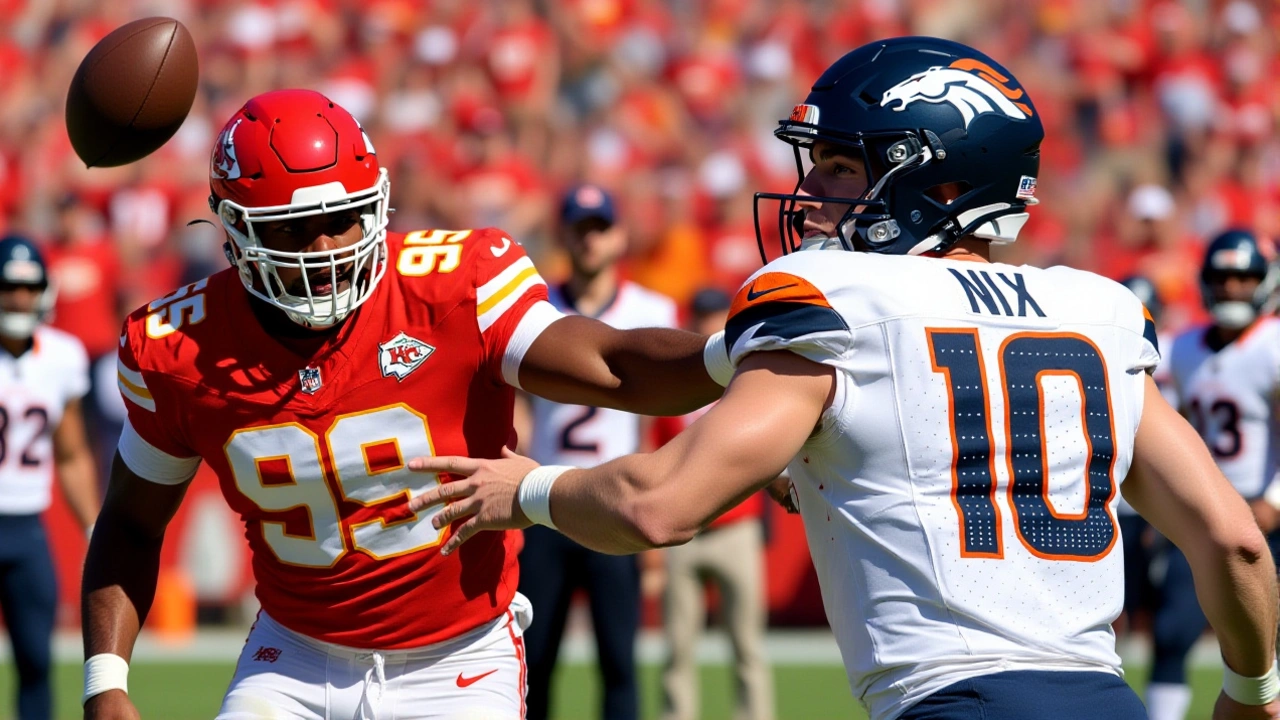Chris Jones Blames Critical Adjustment for Chiefs’ Shocking 22-19 Loss to Broncos

When Chris Jones stepped to the podium in Denver on November 16, 2025, his voice wasn’t angry — it was heavy. The Kansas City Chiefs had just lost 22-19 to the Denver Broncos at Empower Field at Mile High, ending a seven-game winning streak against their AFC West rivals. Jones, the defensive tackle who’d just notched his third sack of the season, didn’t point to missed tackles or bad luck. He pointed to something quieter, more dangerous: a failure to adjust. "This Moment Right Here is Very Pivotal for Us," he said. And in those words, the Chiefs’ season took a sharp turn.
The Game That Broke the Streak
The numbers told one story: Kansas City outgained Denver 357 yards to 318. They converted 41.7% of third downs — not great, but not disastrous. The Kansas City Chiefs defense, ranked third in the league in sacks entering Week 11, still managed to pressure Bo Nix and force three punts. But the Denver Broncos made the critical plays when it mattered most. With 2:17 left and the Chiefs facing third-and-10 at their own 38-yard line, Ja'Quan McMillian — a second-round pick out of Louisville — blew past right tackle and dragged Patrick Mahomes II down for a sack that killed the drive. The Broncos ran out the clock. No drama. No miracle. Just execution.
It was the first time since Week 17 of 2022 that the Chiefs had lost to Denver. Seven games. Seven wins. All by double digits. Now, the tables had turned. And the loss dropped Kansas City to 8-3, while Denver climbed to 6-5 — a team that, just weeks ago, was written off as a playoff afterthought.
What Jones Didn’t Say — But Meant
When Jones called the loss "pivotal," he wasn’t being poetic. He was being precise. The Chiefs’ defense had spent the week preparing for Denver’s run-heavy scheme — Nix’s mobility, the misdirection plays, the quick slants to Jerry Jeudy. But what they didn’t account for? The Broncos’ sudden shift to play-action deep balls on third downs. Three of Denver’s seven third-down conversions came on passes over 15 yards. Two of them were thrown off play-action fakes that froze Kansas City’s linebackers.
That’s the adjustment Jones was talking about. The Chiefs kept dropping into zone coverage, expecting the run. But Denver’s offensive coordinator, Mike Kafka (who’s quietly become one of the league’s most underrated play-callers), started faking handoffs and throwing deep to rookie receiver Antonio Williams, who caught two critical passes for 47 yards on those drives.
"We saw it on film," Jones told reporters afterward. "But we didn’t react. We kept waiting for the handoff. And they didn’t give it to us. That’s on us. Not the scheme. Not the calls. Us. We didn’t adapt. And that’s what cost us."

Who Made the Difference
It wasn’t just McMillian’s sack. It was Wil Lutz, Denver’s kicker, who drilled four field goals — including a 52-yarder in the third quarter that shifted momentum. It was Bo Nix, who completed 23 of 32 passes for 211 yards, with zero turnovers. And it was the Broncos’ offensive line, which held Kansas City’s pass rush to just two sacks — one from Jones, and one from George Karlaftis in the first half.
Meanwhile, Mahomes — who finished 21-of-30 for 204 yards — was under constant pressure. He threw two interceptions, one on a misread of coverage, the other on a tipped ball that bounced into the arms of Pat Surtain II. The Chiefs’ offense, usually so explosive, looked sluggish. No big plays. No 20-yard runs. Just grind-it-out drives that stalled at the 30-yard line.
The Ripple Effect
This loss doesn’t just hurt the Chiefs’ record. It hurts their aura. For years, Denver has been the team that Kansas City breaks — not the other way around. Now, the Broncos have a psychological edge. And in a division where every game is a battle, that matters. The Chiefs still lead the AFC West, but their lead is now just one game over Las Vegas, and two over Denver. With three games left, the playoff picture is wide open.
For Jones, the pressure is mounting. He’s the defensive anchor. The guy who’s supposed to be the difference-maker. He’s been named to the Pro Bowl every year since 2018. But this season, he’s been quiet — only three sacks through 11 games. That’s half his total from 2024. The Chiefs’ defense as a whole has dropped from 1st in sacks in 2024 to 7th this year. The adjustments aren’t just happening on the field — they’re happening in the front office too. Rumors are swirling that defensive coordinator Steve Spagnuolo could be replaced after the season if the team doesn’t turn things around.

What’s Next? The Rematch Looms
The two teams meet again on the Week 17 matchupArrowhead Stadium — a game that now carries playoff implications. The Broncos will be favored by some. Not because they’re better — but because they believe they can beat the Chiefs now. And belief, in football, is everything.
For Kansas City, this isn’t just about fixing a defensive alignment. It’s about fixing a mindset. They’ve spent years playing with a swagger. Now, they’re playing with doubt. Jones knows it. Mahomes knows it. And if they don’t fix it before December 21, the entire narrative of this season could change.
Frequently Asked Questions
Why was Chris Jones’s third sack not enough to win the game?
Jones’s sack forced a field goal attempt in the second quarter, but Denver’s Wil Lutz converted it — turning a potential turnover into three points. The Chiefs’ defense didn’t capitalize on the momentum. They allowed Denver to convert three of their next four third downs, including a 15-yard pass on third-and-12 that extended the drive. Sacks matter, but so does what happens after them.
How did Ja’Quan McMillian’s sack change the game’s momentum?
McMillian’s sack with 2:17 left ended Kansas City’s final drive — a 12-play, 58-yard march that had the Chiefs within field goal range. Had Mahomes completed that third-down pass, the Chiefs would’ve had a chance to tie or take the lead. Instead, Denver took over on downs and ran out the clock. It was the first time since 2021 that McMillian recorded a sack in the final two minutes of a game.
What does this loss mean for the Chiefs’ playoff chances?
The Chiefs are still in good position — 8-3 is a strong record — but their path to the No. 1 seed just got harder. They’re now tied with Buffalo and one game behind the Ravens. A loss to Denver in Week 17 could drop them to the No. 3 seed, meaning a road game in the divisional round. Home-field advantage matters more than ever in January.
Is this loss a sign the Chiefs’ defense is declining?
The numbers suggest it. Kansas City’s sacks are down 30% from last year. Their third-down defense has slipped from 32% to 42% allowed. Jones, Karlaftis, and Willie Gay Jr. are all playing through minor injuries. The secondary has been shaky since Justin Reid went on IR in Week 7. This isn’t a fluke — it’s a trend. The defense needs to retool before the playoffs.
Why is this game considered a turning point for the Broncos?
Denver hadn’t beaten Kansas City since 2022. Now, they’ve done it twice in 11 weeks — and both times by exploiting the Chiefs’ defensive rigidity. This win proves they can compete with the elite. It’s also the first time since 2015 that the Broncos have won back-to-back games against the Chiefs. For a franchise that’s been rebuilding for years, this isn’t just a win — it’s a statement.
What’s the historical significance of this matchup?
This was the 154th regular-season meeting between the two franchises, dating back to 1960. Before this game, Kansas City led the all-time series 60-92-1. Now, it’s 61-92-1. The Chiefs’ seven-game winning streak was their longest against Denver in franchise history. Breaking that streak gives the Broncos emotional leverage — and makes every future meeting more intense.